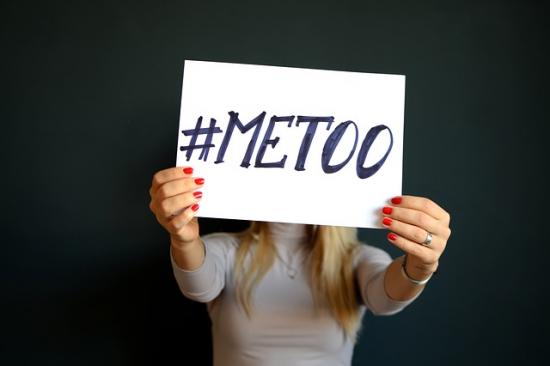
When it was alleged that Paige Patterson, president of the Southwestern Baptist Theological Seminary, had counseled women to stay with their abusive husbands and forgive their rapists without going to the police, some were shocked that such teaching could come from Christian circles. When he was asked to resign from his position but still granted an honorary emeritus title, some were stunned that the church could be so tone deaf. (Update: As of May 30, Patterson has been fired and stripped of titles and benefits).
Not me. I’ve been waiting for this shoe to drop for a long time. And I’m sadly confident there are more to come.
The past year and a half has been a crucial one for women and a point of no return for men who have abused, exploited and harassed them. From Louis C.K. to Harvey Weinstein, and from John Lasseter to Bill Cosby, the blade is dropping on men who used their positions of power to take advantage of women and satisfy their own perverted urges.
For the most part, despite the reveal about Patterson and the brief trending of the #ChurchToo hashtag, the spotlight has stayed on Hollywood. For many conservatives, I wager it is tempting to gloat that the liberals are finally getting what’s coming to them. But I’d caution against smugness. Just because stories of misdeeds at local churches aren’t yet being broadcast on TV or splashed across the internet doesn’t mean that they aren’t happening. Paige Patterson is proof of that. While he’s not alleged to have harassed or abused anyone himself (although his comments about women and teenage girls should have been addressed long ago), the type of counsel he provided created a climate where abuse, harassment and rape could occur with little consequence to the perpetrators because … well, they were men. And while I’m glad many prominent Christian leaders, including several in the Southern Baptist denomination, have opposed Patterson, I can guarantee that there are more like him out there, or those who won’t speak his words but quietly agree with them. I say that because I’ve grown up in those churches, in that circle.
I’m going to apologize out of the gate for what I know will be the scattered nature of this post. For one, I’m writing it at the end of a long Memorial Day weekend. For another, I don’t know that I yet have my arms wrapped around the subject or that I’ve even decided where I stand on some of these theological issues (although let me firmly state: it is never right to abuse, mistreat, rape or harass women or to counsel them to stay in abusive relationships). I’ve put off writing about this for a long time because I’ve had scattered thoughts on this issue but haven’t known how to bring them together. I figure it’s now or never, and maybe it’s best to purge my thoughts and hope God lets some sense emerge.
Because we’re going to see a crisis in the church. Men like Patterson are, sadly, not rare. They may have a more couth delivery and a softer hand, but there is something in the church allowing this climate to fester. And when the church can’t control the treatment of women behind its own doors , what hope does it have to be salt and light to the culture outside of it?
But it’s not as simple as treating people better. What’s behind much of this is not an issue of simple respect or manners but a theological doctrine that, in a perfect world, might have merit but in the wrong hands can harmful and dangerous. And so that’s where I’ll start, with an explanation and my own confession.
What is Complementarianism?
At the heart of Paige Patterson’s counsel is a doctrine known as complementarianism. It’s the belief that men and women have different, God-given roles in marriage and in the church, and it’s a very commonly held doctrine in many conservative theological circles, not only in Christianity but in Judaism and Islam. In Christianity, the way this works out is that men are the providers, protectors and spiritual leaders in their home and the elders, preachers and teachers in the church. Women are nuturers, caretakers, and nursery help.
Strictness on this can vary — some Christians believe this prohibits women from being anything but stay-at-home moms while others believe you can still be complementarian and have a stay-at-home dad and work-in-the office mom; while the vast majority of complementarians believe women cannot be pastors, some churches believe this prohibits women from serving in any leadership of men, including Sunday School classes or speaking from the pulpit at all; others believe the pastor/elder function is the sole prohibition. But in the end, the heart of the belief is that God created men and women equally (this is key and will come back later) but with different roles to play; they complement each other. The other view would be egalitarianism, which views men and women equally, with the ability to play various roles.
There’s biblical basis to complementarianism, mostly coming from a few passages from Paul and the order of creation with Adam and Eve (Adam, according to complementarians, neglected his leadership role when Eve was tempted; she didn’t go to her husband for counsel when tempted. That’s why we sin and die). There’s also plausibility to egalitarianism; Jesus said that in the Kingdom there would be no man and woman (an argument complementarians don’t like because then you have to deal with issues of homosexuality, gender transitions, etc.). And, of course, it’s worth noting that the Bible was written in a highly patriarchal and often misogynistic society. While the Gospel was revolutionary in terms of treating women as having equal status with men, I’m sure change was slow. Would the church and the culture have been ready for a religion in which women were ministers after eons of subordinate status? Would Jewish men, whose prayers often included thanks for not being made a woman, be able to jump wholeheartedly into a new belief system that upended all of their cultural norms? Maybe Paul’s writing was to a culture where the idea of women in leadership roles was unfathomable; but then again, if you believe the Bible is God-inspired, who are we to change it?
You see the point. This is a divisive issue. People cling tightly to it. And, honestly, it’s not an area where I’m deeply studied. I’m just getting my feet wet as I try to figure out what I believe these days on this subject. And the truth is, I think there are merits to both doctrinal beliefs.
But that hasn’t always been the case. I grew up in Baptist circles, some of which were not much different than the ones Patterson worked in. Some were Southern Baptist, some were not. Some were staunchly complementarian and some were “soft complementarian.”
I grew up believing only men could be church leaders because, well, that’s how it always had been. In my twenties, when I was deeply in my early Reformed days, this doctrine was held by myself and many of my friends as being probably just below the doctrines of justification and election. I remember going on a camping trip with several friends near an amusement park. We traded off doing Bible studies each morning. One day, it was my female friend’s turn, and I didn’t think anything of it. But I was approached afterward about whether it was appropriate to have a female lead morning devotionals for a mixed group of twentysomethings (in my defense: yes, it was).
That friend, one of my very best, grew up in a denomination under female leadership. We went back and forth for hours on the subject, with me drafting long-winded emails (similar to this long-winded blog post) about why it was biblically wrong for her to learn from female senior pastors, and her responding passionately about how much she’d learned from them and how God had used them in her spiritual growth. We eventually agreed to never discuss the matter again.
But God has a sense of humor. My wife grew up Methodist, under the tutelage of female pastors who were crucial to her spiritual life. More than that, she’d also been used in her church to teach a (mixed) Sunday School class and serve on that church’s leadership council. My wife, I should also note, has a stronger faith than I and convictions that I deeply admire. So I didn’t press the subject too much. When we got married at her church, though, I asked my senior pastor at the time to co-officiate because I still wasn’t sure what I thought on the subject. Today, I might still be muddy on where I stand, but there’s been enough of an evolution that I feel silly having pushed the issue at all.
Like I’ve said, I’m fuzzy on where I stand on this issue today and how important it really is. I don’t think I’d be offended if I had a female Sunday School leader or if a woman gave the sermon one Sunday. Am I ready to make the jump to a female senior pastor? I don’t know. What’s more is that I don’t know if my hesitancy would be because of any theological hang-ups or because it’s just different. It’s an issue I need to study and pray on more.
But one thing I do know. Complementarianism, if followed, has to be done with humility and love. Because when it doesn’t, it’s hell for women.
When Complementarianism curdles
For complementarianism to work, there must be a commitment to seeing and treating men as women as equals. Yes, if you believe there are God-ordained roles for them to follow in a spirit of love and submission to each other, that’s fine. But supporting that has to be the reinforcement that a role defined isn’t a worth ascribed and that humble submission to a role doesn’t mean that someone is spiritually, intellectually or morally inferior.
Unfortunately, that doesn’t often happen. Women are often seen as nothing more than “help meets,” people whose sole purpose is to support their husband’s plans and dreams, particularly if their husband is in the ministry. They are seen as a “weaker vessel,” not as simply physically weaker but inferior. Women are often told not to trouble a pastor or elder with a question; they need to ask their husband. Men are looked at with suspicion if their wife is the one leading prayer or devotional times in the home. It’s not rare in some circles for men to get a call from another church member telling them to have a talk with their wives about what they see as inappropriate behavior. And pastors and elders will often refuse to take criticism or suggestions from a woman seriously; if they have a concern about what’s going on in the church, then their husbands are expected to bring that up, a bastardization of Paul’s comment that he doesn’t permit women to speak in church but expects them to learn in silence (a comment that is either a cultural concern, a specific reference to something going on in circles at his time, or proof that Paul might have had some problems with misogyny, which is possible considering the Bible was God-breathed, but written by flawed men).
And you can’t address the issue of men and women, particularly in the context of marriage, and not have sex come into the conversation. And what happens if you don’t believe that women and men are equal; that men, in fact, are superior and more important in God’s eyes? Women become sex toys, tools for husbands’ gratification, temptresses to pious men. Women are told to dress a certain way because, if they don’t, they will be responsible for causing their brother to stumble instead of him being responsible for his own thoughts and actions. Women are told that they have to give sex to their husband at all times to keep him from going elsewhere (some prominent theologians have taken this to graphic extremes).
And that’s how you have men like Paige Patterson who think nothing of telling women to go home to their abusers and submit to them. That’s how you have men minimize rape. And it’s how you have men not held accountable for their own sexual misbehavior. I’ve seen this in churches throughout my life. At one church, my best friend at the time, the youth pastor, used his position of power to engage in a relationship with a girl in his youth group. They are happily married today, which is great, but the abuse of power dynamics in that situation was ignored and eventually championed by the leadership of that church. The church I attended afterward had an associate pastor who preyed on women in the choir and eventually engaged in an extramarital affair with them. Yes, both the pastor and the women he slept with where at fault; but it was his position as a man in power that allowed him to get away with it.
Is the problem complementarianism? Again, I don’t know. Like I said, there’s biblical merit to it. More than likely, though, what’s wrong is a perversion of this doctrine. It’s not complementarians who are to blame; rather, it’s men who use complementarianism as a cover for power. They use it to hold onto their status as powerful leading men and to have authority over women. They’re swayed by it to see a world in which women are lesser-thans. And when that spirit exists in the church, everything begins to fall apart.
Is there a way forward?
Like I said, there hasn’t been an epidemic of reveals similar to #MeToo in the church yet. Paige Patterson is one of the few public cases, although I’m sure it’s cropped up in congregations around the country. I’m also glad to see that some in leadership, such as complementarians Al Mohler and Russell Moore, have addressed Paige Patterson and spoken of it as a black mark on evangelicalism. I’m deeply grateful to attend a church where our pastor did a multi-week study on the #MeToo movement that wasn’t shy about calling the church to account for its failures.
But I think we will see more of this. As #MeToo and #TimesUp gain momentum, it will trickle down into our congregations (remember, Christian culture tends to be about a year or two behind in the cultural cycle). People won’t stand for this behavior. There will be calls for change. But what does that look like, especially when it might call us to rethink some deeply held doctrines?
I’m not an elder or a pastor, so I can’t really speak concretely to that. However, I have two humble thoughts:
One is that it might be time to stop holding so tightly to complementarianism. I’ve been deeply disheartened as some prominent theologians, such as John Piper, have made this non-salvific issue one of the bedrocks of their teaching, revealing themselves as out-of-touch and uncaring to women in the faith. It’s an important issue, particularly for those in the ministry, but it’s not an ultimate one.
More than that, as I’ve said, I wonder if we’ve proven we can’t handle this doctrine responsibly. If our beliefs and theology are leading to harm, maybe we need to pull them off the shelf and take time to humbly re-assess them. Or maybe it’s not so much a re-assessing of the doctrine but of ourselves, our own proclivities and our own attractions to power (remember, harassment and assault are rarely sins of lust but of power). If people are hurting because we mishandle Scripture, maybe we need to hold it loosely until we’ve asked forgiveness and begun moving forward in repentance. Maybe some leaders need to ask if their stronghold on complementarianism is really just a stronghold on power and authority. Maybe it’s not so much a problem of this being unbiblical as it is one of being one we can’t deal rightly with because we’re addicted to our position.
But I also wonder if there’s another solution, one I’ve addressed before. And it’s one that calls for the church to embrace diversity. Maybe churches should be less concerned about being complementarian and more open to being a home for complementarians and egalitarians together. Egalitarians may have a lot to learn about humble submission and gender diversity, and complementarians may need to be held accountable and reminded that women have a voice. Truthfully, I don’t know what this looks like, as it would require the whole church taking a more flexible, ever-changing approach to its leadership and makeup. But maybe that’s not a bad thing either. Maybe instead of inflexibility and hanging onto entrenched rules it’s important for the body to regularly and intentionally reconsider the needs of the congregation, the role of leadership and who has a voice.
#MeToo is a long time coming to our culture and there’s a lot of healing that has to take place. I believe the church can be a voice for healing in this society. But it has a lot of baggage to atone for before it can begin.












